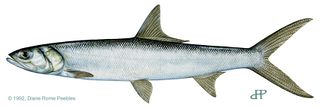Ladyfish: Difference between revisions
mNo edit summary |
mNo edit summary |
||
| Line 1: | Line 1: | ||
<div class="irlbody"> | <div class="irlbody"> | ||
{{IRL header estuary|cat=Fish}}<div class="irlcontenttop" style="margin-top:1em"><!-- {{subst:#InterwikiExtract:Elops saurus|format=text}} --> | {{IRL header estuary|cat=Fish}}<div class="irlcontenttop" style="margin-top:1em"><!-- {{subst:#InterwikiExtract:Elops saurus|format=text}} --> | ||
[[File:Ladyfish.jpg|alt= | [[File:Ladyfish.jpg|alt=Ladyfish (Elops saurus)|thumb|320px|right|Ladyfish (Elops saurus)]] | ||
<p>The <b>ladyfish</b> or <b>tenpounder</b> (<i>Elops saurus</i>) is a species of fish in the genus <i>Elops</i>, the only genus in the monotypic family Elopidae. | <p>The <b>ladyfish</b> or <b>tenpounder</b> (<i>Elops saurus</i>) is a species of fish in the genus <i>Elops</i>, the only genus in the monotypic family Elopidae. | ||
</p> | </p> | ||
Revision as of 04:33, November 23, 2021
The ladyfish or tenpounder (Elops saurus) is a species of fish in the genus Elops, the only genus in the monotypic family Elopidae.
Description
Like other species in its genus, the ladyfish has a long, slender, rounded body covered with silvery scales. Its mouth is terminal and the tail is deeply forked. The species can be distinguished by counting the number of gill rakers and vertebrae.
Distribution
The ladyfish is distributed in the western North Atlantic Ocean from New England to Florida, and the Gulf of Mexico. Its distribution overlaps with the malacho (Elops smithi) in the southeast US and the southern Gulf of Mexico.
Biology
Like other members of the Elopidae, the ladyfish is a pelagic fish that spawns in the sea, but little is known about this marine phase. The larvae, which are transparent and laterally compressed, are dispersed inshore and enter embayments, where they live for 2 to 3 yr. The juveniles are euryhaline, or tolerant to a wide range of salinity, so these embayments may be low-salinity estuaries or hypersaline lagoons. Subadults move into the lower reaches of the embayments, and upon maturation, proceed to offshore, marine habitats.
Threats
This species uses estuarine areas and hypersaline lagoons; changes in the quality of these habitats may affect this species' population dynamics. Although this species may not be closely associated with any single habitat, it may be adversely affected by development and urbanization.

